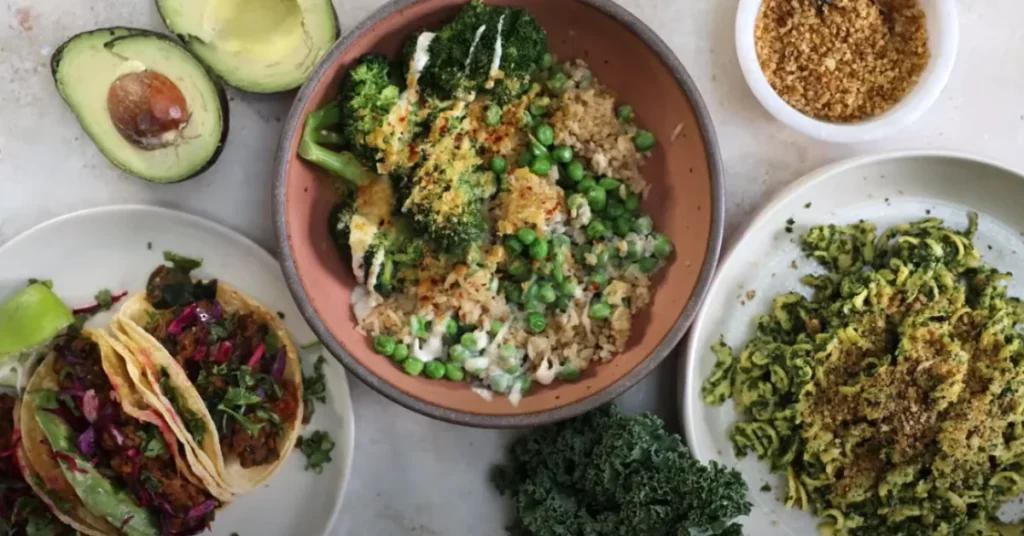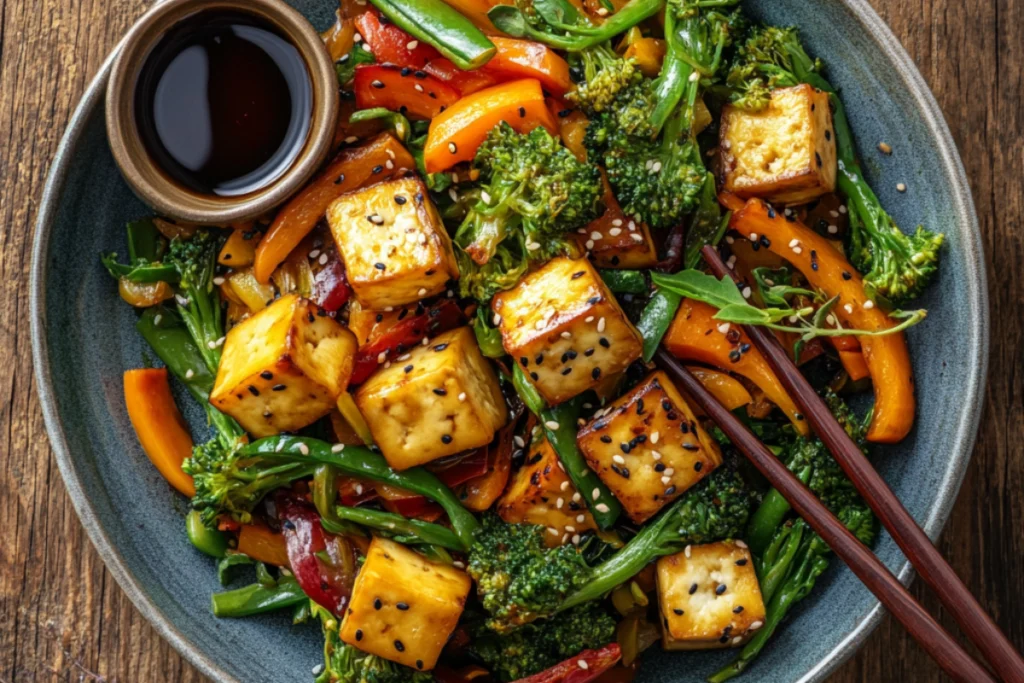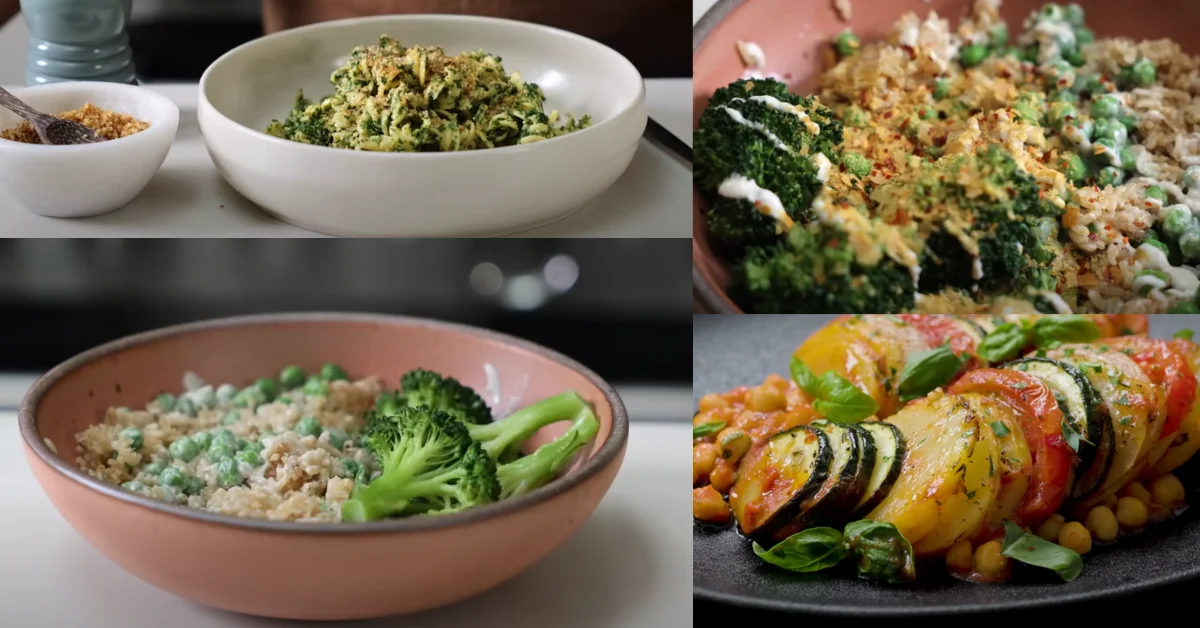Introduction to Vegan Food
Vegan food is more than just a diet; it is a lifestyle that eliminates all animal-derived products, including meat, dairy, eggs, and even honey. Instead, it focuses on plant-based foods that promote health, sustainability, and ethics. As more people become aware of the benefits of veganism, this lifestyle has gained immense popularity worldwide.
Moreover, switching to a vegan diet offers numerous benefits. From reducing your environmental footprint to supporting cruelty-free practices, veganism embodies ethical and sustainable eating. Additionally, vegan diets are associated with lower cholesterol, better weight management, and a reduced risk of chronic diseases. For meal ideas and inspiration, check out this recipes collection featuring dishes that are easily adaptable for vegan diets.
However, despite its advantages, many misconceptions persist about vegan food. People often assume vegan meals are bland or nutrient-deficient. In reality, vegan meals are incredibly versatile and packed with essential nutrients. If you’re new to this lifestyle, starting with a beginner-friendly vegan food list is key. Recipes like the Mediterranean Quinoa Power Bowl are a great example of how satisfying and healthy vegan meals can be.
Why Choose Veganism?
Ethical Reasons
One of the most compelling reasons to adopt veganism is ethics. Vegans consciously avoid consuming animal-derived products to minimize animal suffering. Furthermore, this choice supports industries that emphasize cruelty-free and sustainable practices.
- Animal Rights: Veganism is an ethical commitment to promoting humane treatment of animals.
- Cruelty-Free Products: By choosing vegan products, you support companies that avoid animal exploitation.
- Compassionate Living: Ultimately, veganism aligns with values of kindness and respect for all living beings.
Environmental Benefits
A vegan diet also plays a vital role in protecting the environment. Since animal farming is a leading contributor to greenhouse gas emissions, deforestation, and water depletion, reducing your reliance on animal products can make a significant impact.
- Lower Carbon Footprint: Producing plant-based foods requires fewer resources than animal agriculture.
- Water Conservation: Animal farming is water-intensive, whereas plant-based diets use far less water.
- Sustainable Agriculture: A vegan lifestyle promotes soil health and reduces pollution, which benefits the planet overall.
Health Advantages
Switching to a vegan lifestyle comes with numerous health benefits:
- Heart Health: Vegan diets help lower cholesterol levels, which reduces the risk of heart disease.
- Weight Management: A diet high in fiber keeps you full longer and aids in healthy weight management.
- Disease Prevention: Studies have shown that plant-based diets can lower the risk of Type 2 diabetes and certain cancers.
For delicious and health-conscious vegan recipes, try the Roasted Stuffed Bell Peppers, which are not only flavorful but also nutrient-packed.
Essential Components of a Vegan Diet
Maintaining a balanced vegan diet requires including all essential nutrients while offering variety. Here’s a closer look at the key components:
Fruits and Vegetables
Fruits and vegetables are the foundation of a vegan diet. They are rich in vitamins, minerals, and antioxidants that support overall health and immunity.
- Fruits: Include staples like apples, bananas, berries, oranges, and mangoes.
- Vegetables: Prioritize greens such as spinach, kale, carrots, broccoli, and zucchini.
Whole Grains
Whole grains provide long-lasting energy and are essential in a plant-based diet. They are high in fiber, B vitamins, and essential minerals.
- Examples: Brown rice, quinoa, oats, barley, and whole wheat bread.
Legumes
Legumes are a powerhouse of plant-based protein, iron, and fiber. They are also incredibly versatile.
- Examples: Lentils, chickpeas, black beans, and kidney beans.
- Pro Tip: Incorporate lentils into soups, stews, and salads for a filling meal.
Nuts and Seeds
Nuts and seeds are packed with healthy fats, protein, and essential vitamins. They are also perfect for snacking or adding texture to dishes.
- Examples: Almonds, walnuts, chia seeds, flaxseeds, and sunflower seeds.
Dairy Alternatives
Plant-based alternatives to milk, cheese, and yogurt are staples of a vegan diet. These not only mimic the texture of dairy but also offer essential nutrients.
- Examples: Almond milk, soy milk, coconut yogurt, and cashew cheese.
For a colorful and nutritious dish, try recipes like the Purple Sweet Potato Recipes, which are as visually appealing as they are tasty.

Nutritional Benefits of Vegan Food
High in Key Nutrients
- Fiber: Found in fruits, vegetables, and whole grains, fiber promotes digestion and supports gut health.
- Vitamins and Minerals: A vegan diet is rich in vitamins A, C, and E, as well as magnesium and potassium.
- Antioxidants: These are present in brightly colored fruits and vegetables and help protect against cellular damage.
Low in Harmful Components
- Cholesterol-Free: Unlike diets with animal products, a vegan diet is naturally cholesterol-free.
- Low in Saturated Fats: This reduces the risk of heart disease and promotes cardiovascular health.
Protein in a Vegan Diet
Contrary to popular belief, vegan diets provide ample protein through plant-based protein sources. These include:
- Tofu and Tempeh: Soy-based proteins that are versatile and easy to cook.
- Seitan: Known as “wheat meat,” it is a high-protein option.
- Legumes and Lentils: These not only offer protein but are also rich in fiber.
For hearty and protein-packed meals, explore recipes like the Stuffed Bell Peppers that combine legumes and whole grains seamlessly.
Avoiding Nutritional Deficiencies
While a vegan diet is nutrient-dense, careful planning ensures you meet all your dietary needs. Here’s how to avoid common deficiencies:
Key Nutrients to Monitor
- Vitamin B12: Since it is not naturally present in plant foods, it is crucial to include fortified products or supplements.
- Iron: Combine iron-rich foods like spinach and lentils with vitamin C sources to enhance absorption.
- Calcium: Found in fortified plant-based milk, tofu, and leafy greens like kale.
- Omega-3 Fatty Acids: Include flaxseeds, chia seeds, and walnuts in your diet.
- Vitamin D: Get enough sunlight exposure or use fortified plant-based milk.
Vegan Recipes to Try
Breakfast Ideas
- Smoothie Bowls: Blend frozen bananas, berries, and almond milk. Add granola and chia seeds for crunch.
- Avocado Toast: Spread mashed avocado on whole-grain bread, and sprinkle with nutritional yeast for extra flavor.
Lunch Options
- Buddha Bowls: Combine quinoa, chickpeas, roasted vegetables, and tahini dressing for a balanced meal.
- Veggie Wraps: Use tortillas filled with hummus, spinach, and grilled veggies.
Dinner Ideas
- Vegan Stir-Fry: Sauté tofu, bell peppers, and rice noodles in soy sauce and sesame oil.
- Stuffed Bell Peppers: Fill bell peppers with quinoa, black beans, and chopped vegetables for a hearty dinner.
Snacks and Desserts
- Hummus with Veggies: Pair carrots, celery, and cucumber with hummus for a healthy snack.
- Dark Chocolate: Opt for vegan-friendly dark chocolate brands.
- Energy Bars: Combine oats, nuts, and dates for a homemade, nutritious treat.
For creative dessert ideas, check out Colorful Ingredients in Cookies, which add a unique twist to vegan baking.

Plant-Based Meat Alternatives
In recent years, plant-based meat alternatives have revolutionized vegan diets, offering familiar textures and flavors without the use of animal products. These alternatives not only make transitioning to veganism easier but also provide excellent sources of protein and nutrients. Popular examples include:
- Soy-Based Products: Tempeh and tofu are versatile options that can be used in stir-fries, curries, or grilled dishes.
- Seitan: Often called “wheat meat,” seitan is high in protein and mimics the texture of chicken or beef.
- Store-Bought Alternatives: Brands like Beyond Meat and Impossible Foods offer ready-to-cook products like vegan burgers, sausages, and ground meat.
These alternatives are ideal for creating traditional dishes in a plant-based version. Whether you’re craving a burger, stir-fry, or meatballs, plant-based meats deliver the satisfaction of familiar flavors with a fraction of the environmental impact.
Improved Gut Health
A vegan diet is naturally rich in dietary fiber, which plays a crucial role in maintaining a healthy digestive system. Unlike animal-based foods, plant-based ingredients like fruits, vegetables, whole grains, and legumes are excellent sources of soluble and insoluble fiber. This helps in promoting regular bowel movements, reducing bloating, and supporting a diverse gut microbiome.
Moreover, fiber-rich foods feed beneficial gut bacteria, which are essential for better nutrient absorption and overall immunity. Studies have shown that diets high in fiber are linked to a lower risk of gastrointestinal disorders such as irritable bowel syndrome (IBS) and diverticulitis.
FAQs About Vegan Food
What is the difference between vegan and plant-based?
While both emphasize plants, veganism excludes all animal products, while plant-based diets may include occasional animal-derived ingredients.
Is vegan food expensive?
No, vegan diets can be budget-friendly when focused on staples like beans, rice, and seasonal produce.
How do vegans get enough protein?
Vegans consume protein-rich foods like lentils, tofu, tempeh, quinoa, and seitan.
Can children follow a vegan diet?
Yes, with proper planning, children can thrive on a vegan diet and meet their nutritional needs.
Is eating out as a vegan challenging?
Not at all. Many restaurants now offer dedicated vegan options or customizable dishes.
Final Thoughts
Adopting a vegan diet is a transformative step toward a healthier, more ethical, and sustainable lifestyle. Not only does it promote personal health, but it also supports environmental conservation and animal welfare.

